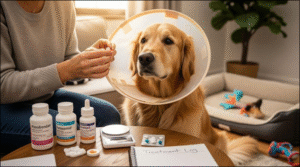When to Neuter a Golden Retriever: A Complete Guide

Introduction
Deciding when to neuter a golden retriever is one of the most important health decisions you’ll make as a responsible pet owner. This surgical procedure, which involves removing the testicles in male dogs, has significant implications for your dog’s long-term health, behavior, and development. Understanding the optimal timing for when to neuter a golden retriever requires careful consideration of multiple factors including age, health status, and breed-specific characteristics.
Golden retrievers, being a large breed with specific growth patterns and health predispositions, require specialized consideration when determining the appropriate time for neutering. Recent veterinary research has challenged traditional early neutering practices, revealing that the timing of when to neuter a golden retriever can significantly impact their risk of developing certain cancers, joint disorders, and behavioral issues.
Understanding Golden Retriever Development
Physical Maturation Timeline
Golden retrievers typically reach sexual maturity between 6-12 months of age, but their physical development continues well beyond this point. Large breed dogs like golden retrievers don’t complete their skeletal development until 18-24 months of age. This extended growth period is crucial when considering when to neuter a golden retriever, as the procedure affects hormone production that influences bone and joint development.
“The growth plates in large breed dogs close much later than in smaller breeds, making the timing of neutering critical for proper skeletal development,” explains Dr. Sarah Mitchell, a veterinary orthopedic specialist at the University of California, Davis.
Hormonal Influence on Growth
Testosterone plays a vital role in the proper closure of growth plates in male golden retrievers. When determining when to neuter a golden retriever, it’s essential to understand that removing the source of testosterone too early can delay growth plate closure, potentially leading to increased height and altered bone proportions.
Traditional vs Modern Approaches
Historical Neutering Practices
Traditionally, veterinarians recommended neutering male dogs between 6-9 months of age. This timing was primarily based on convenience and the prevention of unwanted breeding rather than comprehensive health considerations specific to when to neuter a golden retriever.
Contemporary Research Findings
Recent studies have revolutionized our understanding of optimal neutering timing. A landmark study published in the journal Frontiers in Veterinary Science in 2020 examined over 15,000 golden retrievers and found significant correlations between early neutering and increased incidence of certain health conditions.
Health Considerations for Timing
Cancer Risk Factors
| Cancer Type | Early Neutering Risk | Late Neutering Risk | Intact Male Risk |
|---|---|---|---|
| Hemangiosarcoma | 3.2x increased | 1.8x increased | Baseline |
| Lymphoma | 2.1x increased | 1.3x increased | Baseline |
| Mast Cell Tumors | 1.9x increased | 1.2x increased | Baseline |
| Osteosarcoma | 2.8x increased | 2.1x increased | Baseline |
Research indicates that when to neuter a golden retriever significantly impacts cancer susceptibility. Dogs neutered before 12 months showed the highest cancer rates, while those neutered after 18 months demonstrated reduced risk compared to early neutering.
Joint and Orthopedic Health
The timing of when to neuter a golden retriever has profound implications for joint health. A comprehensive study by Hart et al. (2016) found that golden retrievers neutered before 12 months had a 5.1% incidence of hip dysplasia compared to 1.7% in intact males.
“Early neutering in golden retrievers consistently correlates with increased rates of cranial cruciate ligament tears and hip dysplasia,” notes Dr. Benjamin Hart, lead researcher at UC Davis School of Veterinary Medicine.
Elbow Dysplasia Considerations
Golden retrievers neutered before 6 months showed a 3.4% rate of elbow dysplasia, while those neutered after 12 months had only a 1.1% incidence rate. This data strongly influences recommendations for when to neuter a golden retriever.
Behavioral Implications
Aggression and Anxiety
The timing of when to neuter a golden retriever can significantly impact behavioral development. Dogs neutered before sexual maturity may retain juvenile characteristics and show increased fearfulness or anxiety. Conversely, dogs neutered after reaching behavioral maturity typically maintain more confident temperaments.
Territorial and Marking Behaviors
Early neutering often prevents the development of territorial marking and roaming behaviors. However, if these behaviors are already established before neutering, the procedure may not eliminate them regardless of when to neuter a golden retriever.
Recommended Timing Guidelines
Optimal Age Ranges
Based on current research, the optimal time when to neuter a golden retriever is between 18-24 months of age. This timing allows for:
- Complete skeletal development
- Reduced cancer risk
- Maintained confident temperament
- Lower incidence of joint disorders
Individual Assessment Factors
Determining precisely when to neuter a golden retriever should involve individual assessment of:
- Family history of joint disorders
- Living situation and breeding intentions
- Behavioral development
- Overall health status
Special Circumstances
Early Neutering Considerations
In some cases, early neutering may be necessary despite increased health risks. These circumstances include:
- Cryptorchidism (undescended testicles)
- Aggressive behavioral issues
- Shelter requirements
- Owner’s inability to prevent breeding
Delayed Neutering Risks
While waiting until 18-24 months is generally recommended for when to neuter a golden retriever, potential risks include:
- Increased risk of testicular cancer
- Prostate enlargement
- Territorial aggression
- Accidental breeding
Pre-Surgical Preparation
Health Screening
Before determining the final timing of when to neuter a golden retriever, comprehensive health screening should include:
- Complete blood chemistry panel
- Cardiac evaluation
- Joint assessment
- Genetic testing for inherited conditions
Surgical Considerations
The surgical procedure itself remains consistent regardless of when to neuter a golden retriever, but older dogs may require extended recovery periods and additional post-operative care.
Post-Neutering Care and Monitoring
Immediate Recovery
Recovery from neutering typically takes 10-14 days, during which activity should be restricted. The timing of when to neuter a golden retriever doesn’t significantly affect immediate recovery requirements.
Long-term Health Monitoring
Golden retrievers neutered at any age require ongoing monitoring for:
- Weight management (neutered dogs have increased obesity risk)
- Joint health assessment
- Cancer screening
- Behavioral changes
Cost Considerations
The cost of neutering doesn’t vary significantly based on when to neuter a golden retriever, typically ranging from $200-$800 depending on geographic location and veterinary facility. However, the long-term health implications can result in substantial cost differences over the dog’s lifetime.
For more comprehensive pet care information, visit Golden Retriever Guides for additional resources on responsible pet ownership.
Expert Recommendations
Veterinary Consensus
Current veterinary consensus suggests that the decision of when to neuter a golden retriever should be individualized based on the dog’s specific circumstances, health status, and owner’s situation. The American Veterinary Medical Association now recommends breed-specific considerations for neutering timing.
Breeder Perspectives
Responsible golden retriever breeders increasingly recommend delayed neutering based on emerging research. “We now advise our puppy families to wait until at least 18 months before neutering, unless there are compelling medical or behavioral reasons to proceed earlier,” states Jennifer Walsh, a certified golden retriever breeder with 20 years of experience.
Alternative Options
Vasectomy vs. Traditional Neutering
Some veterinarians now offer vasectomy as an alternative to traditional neutering, allowing hormone production to continue while preventing reproduction. This option may be considered for owners concerned about the health implications of when to neuter a golden retriever.
Chemical Castration
Temporary chemical castration using implants provides a reversible option for owners uncertain about permanent neutering timing. This approach allows for delayed decision-making regarding when to neuter a golden retriever.
Research and Future Directions
Ongoing research continues to refine recommendations for when to neuter a golden retriever. Studies examining the effects of gonadotropin-releasing hormone agonists and other hormonal interventions may provide additional options for optimizing health outcomes while managing reproduction.
The veterinary community actively pursues research into breed-specific neutering protocols, with golden retrievers serving as a model breed due to their well-documented health predispositions and extensive genetic databases.
Conclusion
The decision of when to neuter a golden retriever has evolved significantly with advancing veterinary knowledge and research. Current evidence strongly supports delaying neutering until 18-24 months of age for most golden retrievers, allowing for complete physical and behavioral development while minimizing long-term health risks. However, individual circumstances must always be considered in consultation with a qualified veterinarian.
The timing of when to neuter a golden retriever represents a critical decision that impacts joint health, cancer risk, and behavioral development throughout the dog’s life. By carefully weighing the benefits and risks while considering your dog’s individual needs, you can make an informed decision that promotes optimal health and wellbeing.
As research continues to evolve our understanding of optimal neutering timing, shouldn’t every golden retriever owner stay informed about the latest recommendations to ensure their beloved companion receives the best possible care?






